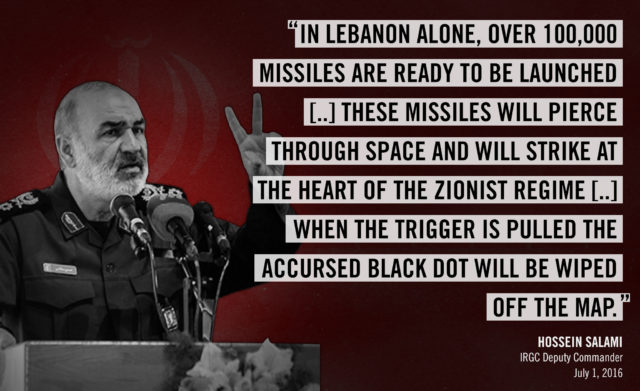The United States persists in treating Lebanon as if it were a country. Congress provides U.S. military assistance to the Lebanese Armed Forces (LAF) and trains the LAF’s officers. And now we’re fighting alongside the LAF, apparently to oust ISIS from encampments inside Lebanon, where they have moved across the border from Syria.
“I can confirm the presence of U.S. Special Forces in Lebanon,” a Pentagon spokesman said last week. “Our special forces are providing training and support to the Lebanese Armed Forces. That not only concentrates on operational type missions, but also tactical and strategic type missions. We also have a presence with Lebanese Special Forces in all aspects of training and special operations.”
This might be necessary expansion of the U.S. war against ISIS in Iraq and Syria, if the LAF were an actual national army protecting an actual country. But make no mistake: the Lebanese government is Hezbollah – a U.S.- and E.U.- designated terror organization. And the LAF is not a national army; it is a fig leaf, a front for the acquisition of Western funds and training, which we foolishly provide. Hezbollah has planted up to 150,000 rockets and missiles among Lebanese civilians south of the Litani River and aimed at Israel, ensuring that civilians will bear the brunt of the next war if, as in 2006, Hezbollah unleashes barrages of rockets at Israeli cities.* One reason it needs help defending Lebanese soil from ISIS is that 15,000 Hezbollah soldiers are in Syria, committing depredations, expelling the Sunni population, and propping up the Alawite dictator in Damascus.
[*As historical oddity, and certainly with no faith that it would matter, in 2006, the U.N. Security Council banned Hezbollah from having any weapons south of the Litani River after Hezbollah’s rocket barrages against Israel. The resolution calls for “full implementation of the relevant provisions of the Taif Accords, and of resolutions 1559 (2004) and 1680 (2006), that require the disarmament of all armed groups in Lebanon, so that, pursuant to the Lebanese cabinet decision of July 27, 2006, there will be no weapons or authority in Lebanon other than that of the Lebanese state.”]
Under what banner does the United States send American troops to defend Hezbollah territory? Let them pull out of Syria and defend it themselves.
Not happening.
Hezbollah’s patron is Iran – which is looking to Lebanon as the westernmost part of the Shiite Crescent from Iran through Iraq and Syria and out to the Mediterranean Sea. The Crescent will ride atop American allies Saudi Arabia, Jordan, and Israel. Iran and Hezb’allah are, in fact, stretched a bit thin, which is why Iran is using Shiite mercenaries from Pakistan and Afghanistan in Syria, but the principle of the Crescent is so important that the commanding forces are strictly IRGC.
By what logic do United States Special Forces help Iran nail down its overland route to the Mediterranean Sea?
There are two more questions:
- How does the United States see the future of the countries of the presumed Shiite Crescent?
- What is it prepared to do to change the future?
Iran is in Iraq at the invitation of the Iraqi government and the agreement of the United States. Iran is in Syria at the invitation of the Syrian government and the acquiescence of the United States. Iran is not yet overtly in Lebanon, but its cutout Hezbollah didn’t need an invitation; it lives there. To round out the party, Saleh al-Arouri, the Hamas military commander in charge of West Bank terror cells, left Qatar in June and went to Lebanon. Al-Arouri was recently photographed with Iranian foreign minister Javad Zarif as they released a joint statement that said, in part, “We concluded that it’s time to turn a new leaf in order to address our shared enemy.”
Well, perhaps Russia will help the U.S. position here.
In fact, Russia’s “alliance” with Iran is an iffy thing – the Russians are not comfortable with Islamic radicalism, whether Sunni or Shiite. On the other hand, thanks to the Obama administration, Iran has enough cash to pay for lots of military hardware, and Russia has little to sell besides military hardware (and wheat and low-priced oil). And Russia’s interest in Syria is essentially limited to guaranteeing the security of its naval bases at Tartus and Latakia, and an air base at Hmeymim. It is not interested in ruling Syria. There is no great incentive for Russia to demand that Iran leave Syria or to make it leave.
That leaves American forces. Will we see the spread of Iranian military might across the Middle East as a problem in the same way we see ISIS? Whatever problems ISIS poses for the region, Iran with its ballistic missile arsenal and nuclear program poses a bigger one. And while the U.S. government has said it does not expect Iran to remain in Syria after the fighting ends, a report that U.S. forces had attacked an Iranian-sponsored Shiite militia in Syria was quickly refuted by official U.S. military sources.
The eight years of the Obama administration encouraged rogue and nasty regimes to believe they could march with impunity toward goals opposed by the United States and its allies. Iran has collaborated with North Korea on non-conventional weapons and missiles for delivery. Iran has fomented war across the Middle East and North Africa. Lebanon is only the latest country to be sucked into the Iranian vortex. American policy should not cede anything more to Iran by sending our soldiers to protect Iranian interests.






